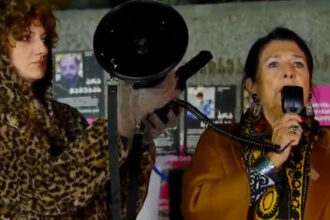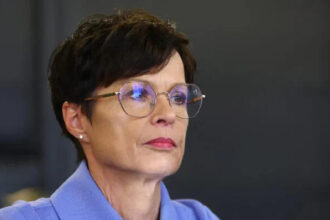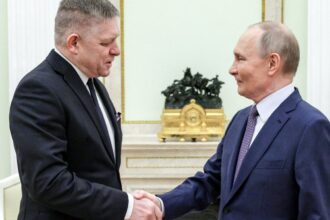Shoghik Kurkchyan (20) will be able vote in Georgia’s parliamentary elections of 2024 for the first time, and will also be observing the elections for the first. Kurkchyan, a second-year student in banking and finance at Tbilisi’s Ilia State University tells Civil.ge she applied to the local monitoring mission for registration as an observer. She wanted to “help people to vote fairly” and make sure that the process was fair.
The October 26 general election is often referred to as a “referendum”, in which Georgians choose between Russia and Europe. It is one of the most closely-watched elections in the history of the country.
Civil.ge quotes Lado Napavaridze, 35, a researcher. “This is the most significant election in independent Georgia and therefore in Georgian History,” he says. Napetvaridze has a Ph.D. and teaches political science at Tbilisi State University. This will not be his first election, but it will be the first time he is a registered voter.
Three and a half millions Georgians are eligible to vote in the first proportional election held in the country. This follows months of antidemocratic drifts from the ruling Georgian Dream Party, which included passing the Foreign Agents Law and antiLGBT legislation. The actions led to the suspension months after the country became a candidate. Pro-democracy and pro-European Georgians are now afraid of their country’s irreversible descent towards authoritarianism.
Georgian Dream will be challenged by pro-Western coalitions and opposition parties. The ruling party has vast administrative, media, and financial resources. There is also escalating anti LGBT propaganda and anti-Western conspiracies.
Kurkchyan said, “I’m worried about my University.” Kurkchyan expressed concern over the fate of Ilia State University. Ilia State University is one of Georgia’s most popular higher educational institutions. The troubles are widely believed to be a part of a government crackdown against critical voices and institutions.
Many other young Georgians are also concerned about the elections. They struggle to imagine their future if the Georgian Dream is still in power.
The vote comes after two highly contested elections held in 2020 and 2021. Local watchdogs expressed concern that the level violations during the campaign, on polling day, including alleged vote buying, illegal mobilization, and vote counting irregularities, could have affected the results.
Fears that the ruling party would try to hijack elections led thousands to volunteer and apply to local monitoring organizations. Volunteers ranged from first-time students to professors, and from a young pianist prodigy to Georgia’s most famous opera star.
Missions Face “Positive Challenges”
Civil.ge reports that Nino Dolidze is the head of Georgia’s main election watchdog, the International Society for Fair Elections and Democracy.
Dolidze points out that the deployment of observers in overseas districts has increased. This year, there were special efforts to increase the participation by expatriate citizens. This has been historically low despite the fact hundreds of thousands Georgians living outside the country. 95,910 Georgians have registered to vote overseas, which is about 45 percent higher than in 2020. While authorities did not open voting stations in many cities despite the demand, civic initiatives are being taken to assist Georgian emigrants with transportation during election day.
And unlike previous elections, when observers were often placed in random locations, this years’ observers are more eager to exercise the right to vote. They hope to be deployed at polling stations where their registration as voters is also present. Dolidze says that it is a positive sign that all of our observers are eager to vote, compared to previous elections when this was not a priority.
ISFED is among more than 100 local organisations that have registered monitoring missions at the Central Election Commission. It plans to deploy about 1,500 observers both inside and outside of the country. It will also provide the results from the Parallel Vote Tabulation, a statistical method used to verify official results. More than 60 international watchdogs are also registered to observe this vote, including the traditional missions of OSCE/ODIHR as well as two U.S. nonprofits, the International Republican Institute and the National Democratic Institute.
While the number of registered organisations is similar to previous elections, the mobilization on the grounds appears more active. Various initiatives, such as “Observe”, Protect”, and “Vote Guard”, have been launched to train, inform and deploy thousands volunteers to protect the voting. New missions have been created to monitor the Georgian elections in addition to the traditional local missions. These include My Vote which is a coalition of dozens civil society organizations that plans to deploy 2,000 observers.
First Predominantly electronic Vote
The vote on October 26 will be Georgia’s very first electronic election. Voters will cast their ballots in polling stations, using electronic machines which identify and count votes. 90% of Georgia voters will use this new procedure to cast their votes.
The new process, which is thought to reduce the risk for certain types of manipulations, has been accompanied by active information campaigns that aim to inform voters about the new way to cast a ballot (filling out a circle rather than circling a specific number) and how to avoid spoiled voting. There have been efforts to reassure the voters that their votes are anonymous. This is in response to reports that the ruling parties may be intimidating voters with suggestions that technologies store identities.
Dolidze says that new technologies do not completely mitigate the risks of potential breaches. For example, a person could vote multiple times or cast a ballot on behalf of someone else. ISFED’s chief also says that “something could happen that we haven’t thought of.”
The CEC will release official preliminary data based on electronic precincts later on election night, after the polls close locally at 8 p.m. The final results will be announced the next day, after all ballots are manually counted.
Until then, a variety of activist groups led active mobilization efforts. These included calls to get out to vote or initiatives to assist commuter voters to get to their polling place.
Napetvaridze asserts that the mobilization effort does not only involve volunteer observers. Kurkchyan, Napetvaridze, and others will be able cast ballots in their respective constituencies, in Ninotsminda in Georgia’s southern Samtskhe Javakheti region and in Tbilisi, while they are also observing the election.
Also Read:
* 2024 Election Live Blog
EU Amb. EU Amb.
Read More @ civil.ge




